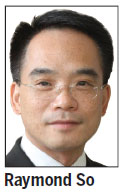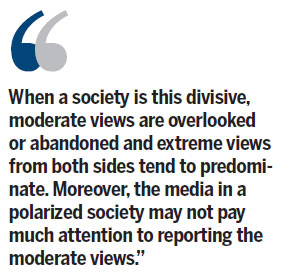Hong Kong is now a deeply divided society
Updated: 2014-07-24 05:52
By Raymond So(HK Edition)
|
|||||||
As we all know the process of political reform in Hong Kong is well underway. The government has completed its public consultation and subsequently presented its report to the National People's Congress.
Despite the completion of the consultation there remain voices of discontent in the SAR. Naturally in an open society it is normal to observe a variety of opinions. It is therefore to be expected that the consultation report does its best to document, in good faith, the great variety of views held by the public on political reform. Nevertheless, because this is such a sensitive issue some groups would doubtless like to see more definite and specific language used in the report. However, the report has to be as neutral and objective as possible. It would have been unwise to use provocative language. Common sense tells us some measure of dissatisfaction is inevitable.
I am not concerned about the discontent that has been voiced concerning the report. Obviously, it is impossible to please everyone. The real challenge facing Hong Kong is finding ways to address the deep divisions we now see in the SAR. We must strive to overcome these. On one side, there are the staunch supporters of the "Occupy Central" campaign who believe the consultation report will do nothing to resolve Hong Kong's differences over political reform. Opposing them are those who do not want to see "Occupy Central" take place. They fear the many possible consequences that could follow "Occupy Central". They generally believe the government has been too lenient towards the opposition camp. Currently these opposing sides seem to have nothing in common and their differences have grown.

Understandably a great deal of negotiation will be necessary to find some common ground between such differing viewpoints.
The resolution of differences has been the subject of many studies. The general belief is that negotiations are necessary. The key thing is for the various parties to explore ways to achieve the greatest benefit from their discussions.
If there is some flexibility between parties, than there is a greater chance of achieving agreement through negotiation. If there is not, the chances of a successful outcome are slim. The parties will be disappointed with the result of the negotiations.
An added problem is that we are now a divided society. This should be a major source of concern. There is also another issue. When people involved in negotiations are from different political camps, they still need to be responsible to their constituents. The difficult thing is that these constituents have a wide range of views on political reform. Many are not willing to compromise. This puts further pressure on the parties involved in negotiations. There will be less room to reach a compromise. So those involved in negotiations will become intransigent and unwilling to make concessions. When opposing parties stand firm in their demands, the negotiation process goes nowhere.

In addition, a divided society means it is difficult to have rational, open debate on political reform. The concerned parties are only interested in their own views and not in the viewpoints of others. When one reads posts on Internet discussion forums for example, it is possible to see the extent of difference in the viewpoints expressed. The sad thing is people tend to be intolerant of opposing viewpoints. Whenever one camp comes up against opposing viewpoints, it labels these opinions by the other camp as worthless or "50 cents" (it is said that some parties pay 50 cents to place a post on the Internet) Some even label such posts using the more insulting name of "dogs". Clearly, these discussions are based on people's personal beliefs and there are few signs of a rational debate. This shows us, to some extent, where society is heading. Sadly there is no sign of any change in sight.
When a society is this divisive, moderate views are overlooked or abandoned and extreme views from both sides tend to predominate. Moreover, the media in a polarized society may not pay much attention to reporting the moderate views. The silent majority have no chance to voice their concerns. It is also difficult for the government to implement political reforms. It becomes harder for civil servants and officials to implement other policies. Society suffers in many ways from deep division. It will take a long time for Hong Kong to overcome this.
The author is dean of the School of Business at Hang Seng Management College.
(HK Edition 07/24/2014 page9)